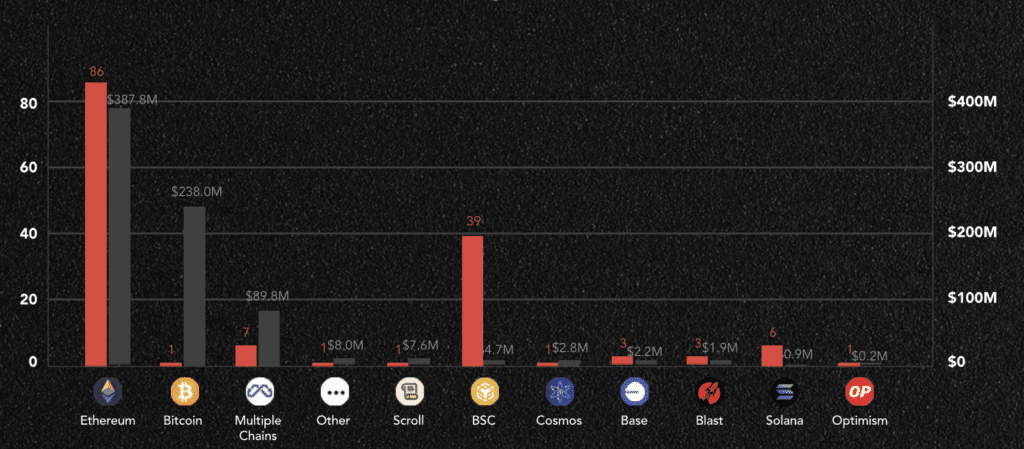Crypto scam
FBI warns of ICHCoin crypto scam costing Americans their life savings
Published
2 months agoon
By
admin

The FBI is sounding the alarm on a cryptocurrency scam that’s cost some Americans their entire life savings.
According to an abc13 report, the bureau alleges that ICHCoin, which lured victims under the pretense of offering a crash course on cryptocurrency investing, is an elaborate scam that has siphoned millions of dollars from individuals across the United States.
FBI Houston’s assistant special agent in charge Amanda Culver told the media outlet that the perpetrators behind the scam have been duping people since December 2023 and have stolen roughly $30 million via the ICHCoin app. Some victims had allegedly lost their entire lifesaving.
Culver added that scammers can easily find victims as “people are very interested in investing in cryptocurrency,” emphasizing the importance of doing proper research before making any investments.
The FBI is currently investigating the scam and has urged victims to come forward with information regarding ICHOCoin or similar scams by filling out their online questionnaire.
How the ICHCoin scam works
According to Culver, the scam works in multiple stages. First, scammers approach victims on social media platforms like Facebook and Instagram. The icebreaker is an offer to educate the victim on cryptocurrency investing, promising to open doors to lucrative profits through crypto investments.
Once victims are convinced, they are redirected to messaging platforms like WhatsApp, where a fake professor or teacher contacts them to proceed with the scam. While Culver did not provide more details on how the scam plays out from here, the Washington State Department of Financial Institutions had flagged ICHCoin in one of its warnings in July.
At the time, crypto.news reported that the victims were lured into the “Excellence and Innovation Fortune Business School,” which is a front for the ICHCoin scam and were added to groups controlled by these fake academics, which offered daily trading signals and investment tips for massive returns.
This is also where the victims are introduced to a fake crypto trading platform, in this case, the ICHCoin app, and urged to make investments. Culver added that the scammers often urge victims to lie to the banks when making transfers to these platforms. The app also shows false return on investment data, but when attempts are made to withdraw any profits, the accounts are frozen, or the scammers ghost the victim.
She also stressed the importance of recognizing red flags, particularly when receiving “unsolicited messages” promising high returns or offering “free money” to investors, emphasizing that these are clear warning signs.
FBI hunting crypto scammers
Over the past months, the FBI has increased its crackdown on cryptocurrency scams and ramped up investigations. The bureau issued warnings regarding crypto threats on multiple occasions in September alone.
For instance, on Sept. 3, the FBI cautioned businesses dealing with crypto exchange-traded funds that the notorious North Korean hacking group Lazarus started using “complex and elaborate” tactics to infiltrate their systems. In a subsequent report, the bureau revealed that over $5.6 billion was lost in frauds and scams involving cryptocurrencies, with individuals over 60 as the most targeted demographic.
In early October, the federal agency also charged an individual with attempting to extort cryptocurrency assets.
Source link
You may like


Pi Network Coin Price Surges As Key Deadline Nears


How Viable Are BitVM Based Pegs?


UK Government to Draft a Regulatory Framework for Crypto, Stablecoins, Staking in Early 2025


Bitcoin Cash eyes 18% rally


Rare Shiba Inu Price Patterns Hint SHIB Could Double Soon


The Bitcoin Pi Cycle Top Indicator: How to Accurately Time Market Cycle Peaks
Crypto scam
Crypto traders doxx 13 year-old-boy who rugged two pump.fun tokens
Published
2 days agoon
November 20, 2024By
admin
A 13-year-old boy got doxxed by crypto traders after pulling the rug on a pump.fun token he named Gen Z Quant. Traders doxxed his whole family and turned them into pump.fun tokens.

A 13-year-old boy has been caught in the middle of one of the most random rug-pulls the crypto community has ever witnessed. On Nov. 20, the unnamed boy launched a token on pump.fun under the ticker QUANT and watched as the price go up by 260% mere minutes after launching.
Not even an hour later, the boy dumps all his QUANT tokens, effectively pulling the rug from under traders who had bought the token minutes before. The boy made a profit of $30,000 by inflating the price and selling all his tokens.
As if that was not enough, he went online and flipped the middle finger at the traders who had been burned by QUANT’s rug-pull. He then went on to do the same thing by launching another token of the same name, which he later dumped for another $12,000 in profit.
Not long after, more experienced traders took over and brought the token’s market cap up to $70 million. The Gen Z Quant token he launched as an elaborate troll is currently trading at $0.05571 according to DEX Screener. It has soared to nearly 50% in the past six hours but is gradually going down hill by 13% in the past hour.
Although the boy has managed to turn his initial $30,000 token into a $2.4 million token, the crypto community was not going to let his misdemeanor slide.
Traders began doxxing the boy’s family and locating his school, tracking their social media accounts and complaining about the funds they lost thanks to the boy’s rug pull. Soon enough, developers began launching new pump.fun tokens named after the boy’s family members with their profile pictures revealed to accompany them.
Pump.fun tokens with the ticker QUANT DAD, QUANT SIS and QUANT MOM have already been circulating the markets, as well as tokens accompanied by a picture of the boy’s whole family and their pet dog with the ticker CABAL.
“Kid put his bloodline on the line,” one user pointed out.
“Then the community cto’d it to $135 million. He could’ve had 1.2 million. Then they doxxed his name, address and sschool. The community is roothless,” said a user on X.
One trader dubbed the boy “the future of finance,” while another reminded the community that this boy represents a messed up generation that has been “optimized to do that to people.”
Source link
Crypto scam
Scammers Decided Not to Operate in TON. Is this good?
Published
1 month agoon
October 23, 2024By
admin
Crypto scammers using malware to steal digital assets refused to attack TON users. However, things are not so clear-cut.
Scam Sniffer experts noted that the operators of a drainer popular among scammers rejected the TON network.
In a message published in an unspecified Telegram channel, the drainer creators announced its closure in the TON ecosystem. The main reason is the lack of crypto whales:
The malicious application’s developers are now moving to the Bitcoin blockchain, which will probably create many more opportunities for scammers to rob.
“What’s next? If you enjoyed draining on the TON network you will definitely live draining Bitcoins.”
One of the main reasons for the lack of whales is the vast number of airdrops on TON. They make fraud not the most profitable way to earn money: phishing schemes on The Open Network bring little profit, reducing scammers’ interest.
However, SlowMist founder Yu Xian said that such an assessment of whale activity in TON may need to be more complex. In his opinion, the drainer team may need to pay more attention to the potential of the TON blockchain.
“A phishing group on TON is ready to shut down, arguing that they believe TON has no whale players and is a small community. They have already turned to the Bitcoin ecosystem… Too realistic. Or maybe this gang isn’t smart enough.”
Yu Xian, SlowMist founder
How the TON blockchain became a new haven for scammers
TON has become one of the most successful stories of 2024, with the value of its token growing by more than 100% since the beginning of the year. In addition, integrating TON with the Telegram messenger, which has more than 900 million users, strengthened its position as a potential residence for the widespread distribution of cryptocurrency.
Scammers’ activity in TON arose against the backdrop of the rapid growth of the blockchain. Due to increased interest and investment in TON, fraudulent activity has gained momentum since at least November 2023.
The interest is mainly driven by the increasing popularity of mini-apps. They successfully exploited the popularity of projects such as Notcoin and Hamster Kombat. Typically, the attackers used the popularity of tap-to-earn games.
For example, Kaspersky Lab noted that scammers offered to earn Toncoin (TON) using bots and referral links. To make it easier to deceive users, the scammers recorded a video with instructions, created text manuals, and provided them with many explanatory screenshots.
Tonkeeper explained that the scammers rely on current trends in the ecosystem. For example, they created a token against the backdrop of the excitement caused by the launch of Hamster Kombat. Therefore, the names and tickers of fake tokens are often consonant with the names of popular projects.
“Usually, scammers create tokens before the official listing of the real coin. Check information about the token launch in official sources.”
Tonkeeper team
Experts from BlockAid also noted that attackers used leak tools previously used on the Ethereum and Solana platforms. In September, more than 300 malicious decentralized applications (dapps) were launched on TON, highlighting the growing threats.
What is the most popular blockchain for fraud?
Despite the growing popularity of TON, the blockchain has yet to boast of popularity among fraudsters, according to data from the REKT Database.
Thus, Ethereum became the leader in phishing attacks last year, suffering losses of over $65 million, 91% of the total loss. Arbitrum also suffered losses of $5.2 million, while Bitcoin lost $768,000.
In terms of exploits, Ethereum was also the most affected blockchain in this category, with losses of $482.7 million, while Binance was the most vulnerable to exit scams, with a loss of $74.5 million.
Regarding attackers’ move to the Bitcoin blockchain, CertiK, another well-known company in the blockchain security field, emphasized that scammers are becoming increasingly interested in Bitcoin due to its high transaction volumes, large user base, and significant total value locked (TVL).

Phishing attacks on Bitcoin have increased significantly in recent months. One of the most notable incidents was the attack on a Bitcoin whale that resulted in $238 million in losses, further highlighting the growing risks in this area.
Source link
Crypto scam
Andrew Tate is Poison — Crypto Must Stand Up for Coffeezilla
Published
1 month agoon
October 22, 2024By
admin
Andrew Tate’s response to Coffeezilla shows he’s thin-skinned and doesn’t care about the people who have invested in his tokens.
On-chain sleuth Coffeezilla has become a thorn in the side of high-profile influencers shilling coins to their millions of fans.
One of his best-known scalps is Logan Paul, who was ripped to shreds over his embattled and now-abandoned project CryptoZoo.
Coffeezilla’s also gone toe-to-toe with the likes of Sam Bankman-Fried as he vies to uncover scams to his 3.77 million subscribers on YouTube.
But now, the investigator is facing an almighty backlash about a deep dive that hasn’t even been released yet — and it relates to a number of coins that have been endorsed by Andrew Tate.
On Wednesday, Coffeezilla shared a DM that he had sent to Tate, asking whether he had been paid to promote cryptocurrencies, including ROOST and DADDY.

The message also pointed out that this is completely at odds with videos that Tate had released on X earlier this year, where he was topless and appeared to have substantially more hair.
I DO NOT ENDORSE SHITCOINS.
I’m not a scammer like every other “influencer”
I don’t need to rob my fans.
I DO NOT HAVE ANYTHING TO DO WITH ANY CRYPTO. pic.twitter.com/tlLQ8Iunz3
— Andrew Tate (@Cobratate) May 17, 2023
Coffeezilla is following a crucial journalistic principle known as the “right of reply.” If you’re going to make allegations against someone, they must have the ability to respond before publication.
But instead of answering the legitimate questions put forward — which would be of interest to his many acolytes — Tate chose to go down the homophobic route.
By the looks of things, this has now unleashed a huge can of worms. Coffeezilla shared a screenshot that shows how his inbox has been bombarded with slurs.
Why? Because Tate reposted an anonymous account that exposed Coffeezilla’s email address, with the misogynist telling his followers: “Email him and call him gay.”
Undeterred, the investigator has insisted that he still wants a reply to his questions — and it’s likely that, if the clock runs out, Coffeezilla’s video will go live anyway without a comment.
The YouTuber also posted a comical mash-up that showed Tate chomping on a cigar because it looks cool, declaring that he respected Coffeezilla, cutting to another clip where he says:
“Coffeezilla is a b****. I don’t give a f*** about your video, I don’t respect your journalism.”
Given how wide-eyed Tate is as he jabs his finger toward the camera, you could suggest that all of this scrutiny is bothering the sham entrepreneur more than he lets on.

What is Coffeezilla investigating?
Coffeezilla, who married his high school girlfriend in 2017, has so far remained tight-lipped about the nature of the allegations against Andrew Tate and his brother Tristan.
But it seems a core part of the focus in his upcoming investigation will surround the $DADDY token, which has fallen precipitously in value since launch and has never recovered.
An all-time high of $0.2925 was set in mid-June when CoinMarketCap started tracking the altcoin — and at the time of writing, it’s down by more than 48%.
Tate’s full rebuttal video is something of a parody — honestly, some of the lines in there are pure comedy, especially how they are delivered. He tells Coffeezilla:
“I guarantee I drink more coffee than you — meaning you’re a fraud to begin with. You’re doing this little breakdown, this investigation, you just emailed me in a homosexual tone.”
To be honest, I don’t even know where to start with this. You can’t have “Coffee” in your handle unless you prove you’ve got a higher caffeine tolerance than Andrew Tate? Daring to scrutinize a man who has more legal troubles than Lamborghinis reveals his sexual preference?
Even before knowing the exact nature of Coffeezilla’s investigation, we have an insight into how thin-skilled Andrew Tate really is — and ultimately, how little he cares for his community, as well as those who have invested in his tokens.
Tate’s toxic masculinity has preyed on the insecurities of disenfranchised young men around the world while his foray into crypto has dived into their wallets — creating a false illusion that they, too, will experience extreme wealth one day.
When you think about it, Tate’s branding and messaging are reminiscent of an era that most of the crypto world has been trying to move away from, when the ICO boom of 2017 was full of wild excesses along with never-ending images of fast cars and bundles of cash.
In this battle, the crypto community needs to rally behind Coffeezilla — a man who has taken great risks to expose bad actors in the space and stand up for those who have lost their life savings to some of the industry’s most audacious scams. He, among others, serves as crypto’s immune system, with every investigation slowly chiseling away at the sector’s “Wild West” image and deterring opportunistic thieves planning to swindle unsuspecting victims.
The crypto community needs to distance itself from narcissists like Tate, who use homophobia as a weapon to deflect against their own shortcomings. Coffeezilla’s sexual orientation has zero relevance to the work he performs, and it’s shameful to think otherwise. Digital assets won’t ever achieve mass adoption if the influencers within this space denigrate innocent people who are doing nothing wrong.
And last but not least, the crypto community needs to realize that Andrew Tate and his coins represent everything that this innovative sector is not: hateful, harmful and dishonest. Engaging with him only drags down the rest of the industry.
Crypto is all about the future. Tate’s worldview belongs to the past.
Source link

Pi Network Coin Price Surges As Key Deadline Nears

How Viable Are BitVM Based Pegs?

UK Government to Draft a Regulatory Framework for Crypto, Stablecoins, Staking in Early 2025

Bitcoin Cash eyes 18% rally

Rare Shiba Inu Price Patterns Hint SHIB Could Double Soon

The Bitcoin Pi Cycle Top Indicator: How to Accurately Time Market Cycle Peaks
Bitcoin Breakout At $93,257 Barrier Fuels Bullish Optimism

Bitcoin Approaches $100K; Retail Investors Stay Steady

Solana Hits New ATH On Huge Whale Accumulation, More Gains Ahead?

Microsoft Should Buy $78 Billion Worth of Bitcoin

Ethereum Believers May Be Staring Down Opportunity As ETH Reaches Another Low Against Bitcoin: CryptoQuant CEO

UK government is ready for crypto regulations next year

“Crypto Dad” Chris Giancarlo Emerges Top For White House Crypto Czar Role

Bitcoin Nears $100,000 As Trump Council Expected To Implement BTC Reserve

Know Your Missiles: Russia’s Experimental Hypersonic Missile Is A New Kind of Killing Machine
182267361726451435

Top Crypto News Headlines of The Week

Why Did Trump Change His Mind on Bitcoin?

New U.S. president must bring clarity to crypto regulation, analyst says

Ethereum, Solana touch key levels as Bitcoin spikes

Bitcoin Open-Source Development Takes The Stage In Nashville

Will XRP Price Defend $0.5 Support If SEC Decides to Appeal?

Bitcoin 20% Surge In 3 Weeks Teases Record-Breaking Potential

Ethereum Crash A Buying Opportunity? This Whale Thinks So

Shiba Inu Price Slips 4% as 3500% Burn Rate Surge Fails to Halt Correction

‘Hamster Kombat’ Airdrop Delayed as Pre-Market Trading for Telegram Game Expands

Washington financial watchdog warns of scam involving fake crypto ‘professors’

Citigroup Executive Steps Down To Explore Crypto
Mostbet Güvenilir Mi – Casino Bonus 2024

Bitcoin flashes indicator that often precedes higher prices: CryptoQuant
Trending

 2 months ago
2 months ago182267361726451435

 24/7 Cryptocurrency News3 months ago
24/7 Cryptocurrency News3 months agoTop Crypto News Headlines of The Week

 Donald Trump4 months ago
Donald Trump4 months agoWhy Did Trump Change His Mind on Bitcoin?

 News3 months ago
News3 months agoNew U.S. president must bring clarity to crypto regulation, analyst says

 Bitcoin4 months ago
Bitcoin4 months agoEthereum, Solana touch key levels as Bitcoin spikes

 Opinion4 months ago
Opinion4 months agoBitcoin Open-Source Development Takes The Stage In Nashville

 Price analysis3 months ago
Price analysis3 months agoWill XRP Price Defend $0.5 Support If SEC Decides to Appeal?

 Bitcoin4 months ago
Bitcoin4 months agoBitcoin 20% Surge In 3 Weeks Teases Record-Breaking Potential


